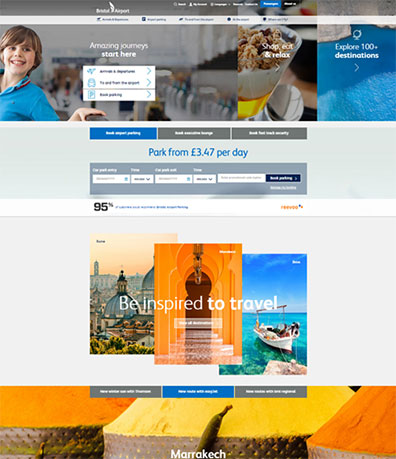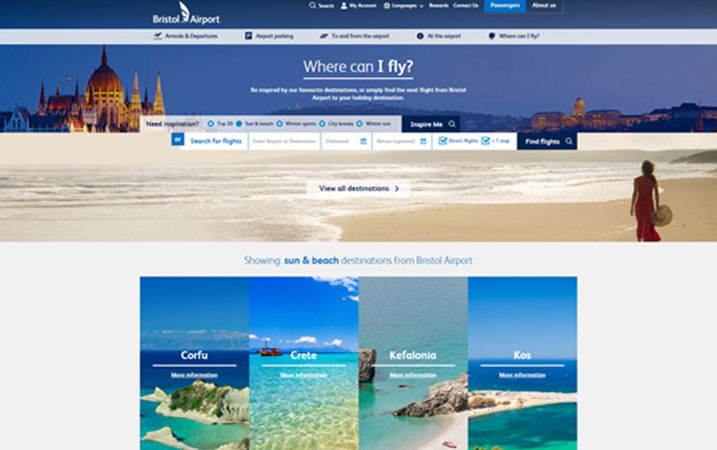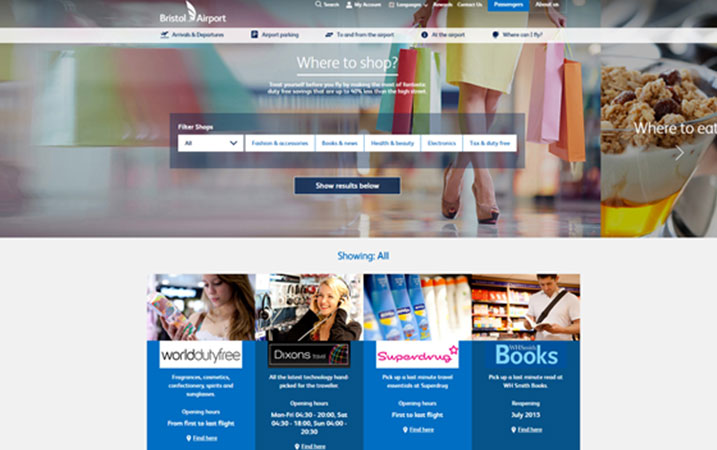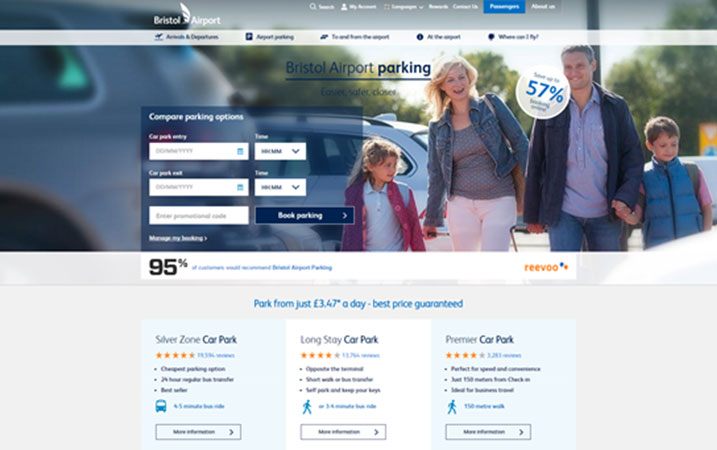
The homepage of the new Bristol Airport website, which creates a seamless, consistent web experience whatever the device, whether on desktop, tablet or mobile.
Digital is playing a crucial role in Bristol Airport’s continued growth. The airport handles 6.3 million passengers annually, and planning permission is in place for facilities to handle 10 million passengers. Work is well underway on an eastern terminal extension, which is set for completion in July.
Bristol Airport’s new customer-focused, responsive website will play an important role in delivering a great experience to that growing passenger base. In particular, this reflects the growth in mobile and tablet visits to the airport’s website, which overtook desktop visits in 2014. “This project is the first major investment in the Bristol Airport website for over four years, bringing it up to today’s standards in terms of consumer expectations,” Isabelle Whiteman, Head of Digital, Bristol Airport, commented. “It enabled us to completely overhaul the design, content and functionality to reflect the changing digital landscape and, most importantly, the continued growth in mobile transactions.”
There were four key aims with the new website – to enhance the user experience, creating a seamless, consistent web experience whatever the device, whether on desktop, tablet or mobile; to support growth in e-commerce and car park bookings in particular; to support customer service and the overall airport experience; and to inspire travel on the Bristol Airport route network and support its airline and tour operator partners.

Bristol Airport’s website provides a new range of functionality, including a destination inspiration and flight schedule section. Users can be inspired by the range of destinations available – whether it’s winter sport, city breaks, or a relaxing beach holiday.

Isabelle Whiteman, Head of Digital, Bristol Airport: “We are continually looking at how digital technologies can enhance the overall airport experience for passengers.”
Whiteman explained that a scoping phase identified the priorities and key functionality for the site. Customer research showed that mobile users are accessing the airport’s website for the same reasons as desktop users, which includes booking parking. This represents a significant change compared with two years ago, when mobile was primarily used to view arrivals and departures. A complete review of the current website was undertaken using Google Analytics to track a range of data, including visitor volumes, user behaviour, and conversion rates. “From here we identified the key pages and templates required, and both functional and technical specifications were created,” Whiteman said. “This ensures that we were clear in terms of both what was being built, and how it would work for the user. A prototype was built and tested on users before going into the final design, build and content loading.”
One of the key differences users will notice is that Bristol Airport has replaced two separate desktop and mobile sites with one new site that is built responsively. The old mobile site was a slimmed down version of the desktop, with limited content and functionality. Visitors now have a consistent and seamless experience, with the same content and functionality whatever device they use. The site recognises the browser size and simply adapts the design and layout to fit.
Indeed, a key challenge has been ensuring that information is presented in a way that is easy to read on mobile. “We have actually used this as an opportunity to review content and make it quicker and easier to scan the key information,” Whiteman explained. “A lot of focus was also given on how to present information such as flight timetables in a way that was intuitive on mobile – we’ve received positive customer feedback so this seems to have worked.”
The new site also has a completely refreshed design and functionality, replacing a look and feel that was four years old. “The aim was to bring the site on-brand to reflect our key customer proposition of ‘Amazing journeys start here’. The new site also focuses on making it easy for visitors to get to their goal, whether it be to book parking, check arrivals and departures, find information on how to get here, or find out where they can fly to from Bristol,” Whiteman added.

The new website includes a much-improved section for shopping and eating.
Embracing e-commerce and customer service
Digital plays a vital role in the airport’s continued growth, both from an e-commerce and customer service perspective. Growth in online bookings for car parking continues as customers enjoy the benefits of both online discounts and the convenience of booking in advance. Sign-up to the Rewards loyalty programme is also prominently displayed. Email marketing through the programme is a crucial communication tool for Bristol Airport, which also uses Facebook and Twitter to drive engagement with its customers.
“We are continually looking at how digital technologies can enhance the overall airport experience for passengers,” Whiteman explained. “An app is an obvious tool and we have recently undertaken a scoping project to identify the most effective way to move this forward, based on customer insights into their needs. We continue to look at opportunities and identify those which will deliver the highest ROI.”

The new Bristol Airport website features an enhanced car park booking section. Growth in online bookings for car parking continues as customers enjoy the benefits of both online discounts and the convenience of booking in advance.
Bristol Airport is demonstrating a proactive approach to harnessing digital to support growth. It undertook user testing throughout the project to make sure that the proposed web design and functionality was intuitive and created an engaging user experience – this meant the airport could fine tune as it went along. Putting time into the front end of the project was also key, enabling Bristol Airport to prioritise functionality and secure efficiencies.
Whiteman’s advice to other airports seeking to maximise the potential of digital is to ensure they listen to their customers, understanding their needs and building solutions they want. “Whilst there are general trends, such as the growth in mobile usages, each airport has a unique customer profile and it’s important to reflect this in order to harness digital to support growth,” she concluded.
Bristol Airport’s new website aims to inspire travel on its route network and support its airline and tour operator partners. Learn more about tourism and its importance to airports and air service development at the 25th ACI EUROPE General Assembly, Congress & Exhibition, taking place in Prague, 24-26 June 2015. Hosted by Prague Airport, the theme of the event is ‘Airports and the Future of Tourism’. The conference features a truly exceptional line-up of CEO-level speakers, with keynote addresses to be delivered by Violeta Bulc, EU Commissioner for Transport, and Michael Cawley, Chairman of Fáilte Ireland, the Irish national tourism development authority.
» More information on the 25th ACI EUROPE General Assembly, Congress & Exhibition here
» Register for the 25th ACI EUROPE General Assembly, Congress & Exhibition








